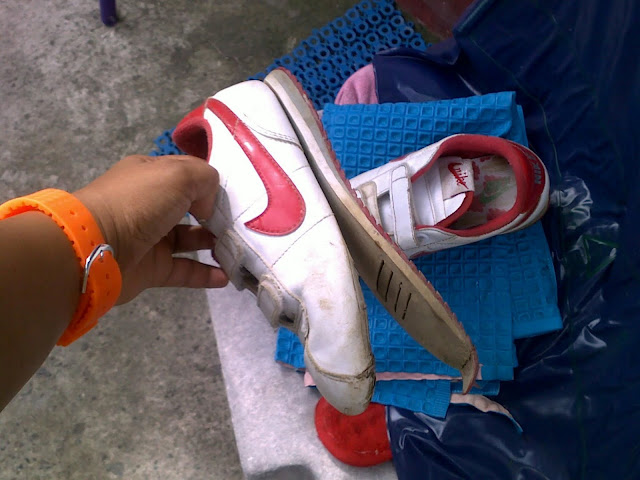
I made a cow costume for Migi for their Christmas presentation. Then, I gave the left-over materials to Meg, and then Mati. :)


Somewhere along this stretch, the confluence of assorted feelings and emotions - pain, exhaustion, heat, sleep deprivation, hunger, frustration, thirst - got the best of me. And before I knew it, tears were streaming down my face. I could not recall the last time something like that happened to me, let alone during a run. I never saw it coming. And for the first time ever, after close to 15 hours of continuous running and walking, I asked myself this question: "Why the fuck am I doing this to myself?" Mind game. I slowed down and composed myself. Instead of trying to find the answer to the question, I told myself to just stay in the game, and to remember the short prayer that I whispered somewhere in Lubao. A son never forgets. And I was again on my way.
 Boljoon, cebu
Boljoon, cebu Just like love, I really do not know how to explain why I love distance running. =) It's probably the mix of pain, unsureness and peacefulness that comes with it. (Emphasis on distance because I get bored with running around the subdivision -- too monotonous.)
Just like love, I really do not know how to explain why I love distance running. =) It's probably the mix of pain, unsureness and peacefulness that comes with it. (Emphasis on distance because I get bored with running around the subdivision -- too monotonous.)APITALISM is a process of creative destruction. The new destroys the old. Both the creation and the destruction are essential to driving the economy forward. Entrepreneurs are central to the process of creative destruction; they bring the new technologies and the new concepts into active commercial use. They are the change agents of capitalism.
The old patterns of powerful vested interests must be broken if the new is to exist, but those vested interests fight back. They are not willing to fade quietly into the pages of history. Entrepreneurs built the national companies that destroyed local companies at the end of the nineteenth century, and they are building the global companies that are destroying national companies at the end of the twentieth century.
History teaches us that it is only too easy to stamp out entrepreneurship. It is a fundamental human characteristic but, despite its creative and destructive powers, an extremely fragile one. Among most peoples in most times and most places entrepreneurs do not exist. The economic possibilities exist, but they are not seen, the energy to realize them is lacking, or the risks they involve seem too great.
When societies aren't organized so that the old vested interests can be brushed aside, entrepreneurs cannot emerge. Social systems have to be built in which entrepreneurs have the freedom to destroy the old. Yet destroying the old can too easily be seen as a step into chaos. Societies that aren't ready to break with the past aren't willing to let entrepreneurs come into existence.


See, if you put the average Silicon Valley geek in front of a TV and tell him to sit on the couch and watch TV for four hours they won???t know what to do. They will start building databases of their favorite shows, start figuring out how to optimize their DVRs so they can fast-forward through commercials faster, and stuff like that.
Normal/average users? They just want to watch TV and drink beer.
So, you getting where I???m going with this? Google+ is for the passionate users of tech. If you just want to sit back and have the system do all the work (which means it???s not perfect, but it???s good enough for most people) then Facebook is gonna be where you stay, especially since your friends are gonna lock you in for quite some time. But if you want to really be able to choose who you listen to, then Google+ is much better.

 Proud Mama =)
Proud Mama =) And, my Migi is a tennis champion, with me not knowing. Sorry, Migi -- beauty pageant interests me more than sports.
And, my Migi is a tennis champion, with me not knowing. Sorry, Migi -- beauty pageant interests me more than sports. A champion's shoes. This is what his shoes looked like after he won.
A champion's shoes. This is what his shoes looked like after he won. This is how Migi attends his practices. Unlike the beauty pageant, his needs a little more effort.
This is how Migi attends his practices. Unlike the beauty pageant, his needs a little more effort. Over a bridge...
Over a bridge... Finally, we made it to the tennis court.
Finally, we made it to the tennis court. This mama is happy. Her kids don't much do good in academics so let's make another school like beauty & wellness & sports & entertainment & cutlure where my kids can do well. =) Life's a variety.
This mama is happy. Her kids don't much do good in academics so let's make another school like beauty & wellness & sports & entertainment & cutlure where my kids can do well. =) Life's a variety.Tigba-id (Bladesmith) 60-sec teaser2 days ago 2 days ago: Mon, Jun 13, 2011 10:28pm EST (Eastern Standard Time)
http://vimeo.com/25062292
In a position that has surprised most IT observers, the Department of Science and Technology (DOST) said in a Senate hearing on Monday that it is opposed to the creation of the Department of Information and Communications Technology (DICT).
Fortunato dela Pena, the long-time undersecretary of







Then there's the Facebook vs. Twitter vs. Foursquare angle. Users of the three social networks exhibit different behavior and different buying frequency. Foursquare users visit Tasti D-Lite more often than Twitter users, who visit more often than Facebook users, Emerson says.
"They're more mobile, they're more active," he says of the stores' Foursquare users. "We've got a year of results. For whatever reasons, it's pretty clear these location-based mobile customers are out and about more and visiting more often."
Emerson has also found that Foursquare users are younger and more thrifty than Twitter and Facebook users - meaning they spend less per visit. "The Foursquare people are looking to get a deal. Facebook is going to skew older, and Faceook users spend more than Foursquare users. Twitter is in the middle."
Shipping release 1.0 is a lot like the birth of a new baby: Lots and lots of pain, followed by a brief period of pure happiness, and then no sleep for quite a while.(via Instapaper)



| Reach (%) | Reach (%) | ||
| 1. Netherlands | 26.1% | 1. Netherlands | 26.8% |
| 2. Ireland | 21.0% | 2. Japan | 26.6% |
| 3. United States | 17.6% | 3. Brazil | 23.7% |
| 4. Canada | 15.6% | 4. Indonesia | 22.0% |
| 5. United Kingdom | 14.9% | 5. Venezuela | 21.0% |
| 6. Denmark | 14.4% | 6. Canada | 18.0% |
| 7. Australia | 13.1% | 7. Argentina | 18.0% |
| 8. New Zealand | 12.9% | 8. Turkey | 16.6% |
| 9. Belgium | 12.6% | 9. Philippines | 16.1% |
| 10. Singapore | 12.0% | 10. Singapore | 16.0% |
(via Instapaper)
Marketing teaches us that the life cycle of a product has four stages, each of which corresponds to one group of people in the market:(via Instapaper)
Early Adopters are risk takers who actually like to try new things.
Pragmatists might be willing to use new technology, if it???s the only way to get their problem solved.
Conservatives dislike new technology and try to avoid it.
Laggards pride themselves on the fact that they are the last to try anything new.
Each stage is very different from the others. Your ISV might be very successful selling products to Early Adopters, but that doesn???t mean you will have any success at all selling stuff to the Pragmatists. These are two entirely different groups of customers and reaching them requires entirely different skills.